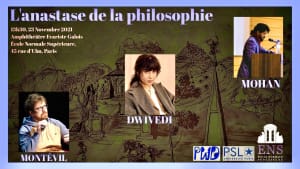The Anastasis of philosophy — seminar

The multiple crises of philosophy (conceptual, institutional, vocational, political, economic) which have constituted a situation of more than crisis—a criticalisation—from which philosophy will not be able to recover into anything resembling what it was in the past. However, these moments of crises also offer a chance to question what were properly philosophical evils and initiate an inventive era of philosophy which will be able to comprehend a new relation with other disciplines including the sciences, psychoanalysis, politics, and technology. The analytic of the stasis of philosophy began with the tradition of deconstruction through Jacques Derrida, Jean-Luc Nancy, and Bernard Stiegler. Today we already have glimpses of philosophy in anastasis, or the experience of philosophy coming over stasis. The four speakers will outline and discuss the other beginning of philosophy.
Organization: Divya Dwivedi, Shaj Mohan, Maël Montévil
Seminar 1. 31 mai, 17h30 -19h30, Salle Cavaillès, ÉNS, 45 rue d'Ulm, Paris
Closure and the identity of scientific objects
Maël Montévil
Mathematical closure has been a cornerstone of physicomathematical thinking, and provides the theoretical identity of its objects – historically grounded on theological views. In other fields, like biology or economy, this view has been imported with more random consequences than in physics. For example, in popular understandings of immunity and in the appropriation of the concepts of immunology in philosophical discourses a certain identity is assumed for the organism. Instead, we will show that the law of identity is invalidated by biology. In its place we should come to a new theory of faculties adequate to understand organism and organic life, to avoid the risk of a stasis which can take hold of biological and political theories.
Discussant: Giuseppe Longo
Seminar 2. 7 juin, 14h – 16h, Salle Gallois, ÉNS, 45 rue d'Ulm, Paris
Ontological Difference and Hypophysics
Divya Dwivedi
In Heidegger's model of philosophy the principle which generates metaphysics is termed "the ontico-ontological difference" or "the difference of Being". The ambiguous genitive indicates the very meaning of Being; the meaning of the "difference" would tell us the essence of Being. Upon investigation, Heidegger's texts regularly reveal the investments he made in the conception of "the west", which are quite distinct from what we come to understand today as the name of a military alliance. Instead, this concept "the west" is invested simultaneously in recovering and covering over a certain "east" which propels it, with which it also seeks to distinguish itself. These investments in turn reveal another difference – the occidental-oriental difference – as something that is neither ontic nor ontological and yet that accompanies and regulates the meaning of the difference of Being. This second difference belongs to what we call Hypophysics (first foreshadowed by Kant who did not elaborate on it), which we will have to learn to diagnose if philosophy is to be released from the end foretold for it.
Discussants: Maël Montévil
Seminar 3. 14 juin, 14h - 16h, salle Weil, ÉNS, 45 rue d'Ulm, Paris
History, Knowledge and Anastasis
Shaj Mohan
Theories of history often emphasise wars as events that are revelatory of the historic sense. This tendency is continuous with the ancient religious practices of divination such as auguries, portents, and revelations, and later theological inventions including theodicy. A conception of history which is neither theological nor metaphysical is necessary to situate human responsibility and reason outside of the excuses of chance and destiny. Such a conception of history shows that there is something more than history—anastasis. Coming towards the relation between history and anastasis requires that we discard classical logic, founded on the law of identity, develop a theory of faculties, and a new experience of knowing.
Discussant: Paul-Antoine Miquel, Michel Bitbol
Seminar 4. 28 juin, 18h30 – 20h30, Salle Gallois, ÉNS, 45 rue d'Ulm, Paris
The Other Beginning of Philosophy
Shaj Mohan, Divya Dwivedi, Maël Montévil
The multiple crises of philosophy (conceptual, institutional, vocational, political, economic) which have constituted a situation of more than crisis—a criticalisation—from which philosophy will not be able to recover into anything resembling what it was in the past. However, these moments of crises also offer a chance to question what were properly philosophical evils and initiate an inventive era of philosophy which will be able to comprehend a new relation with other disciplines including the sciences, psychoanalysis, politics, and technology. The analytic of the stasis of philosophy began with the tradition of deconstruction through Jacques Derrida, Jean-Luc Nancy, and Bernard Stiegler. Today we already have glimpses of philosophy in anastasis, or the experience of philosophy coming over stasis. The four speakers will outline and discuss the other beginning of philosophy.
Discussant: Jérôme Lèbre